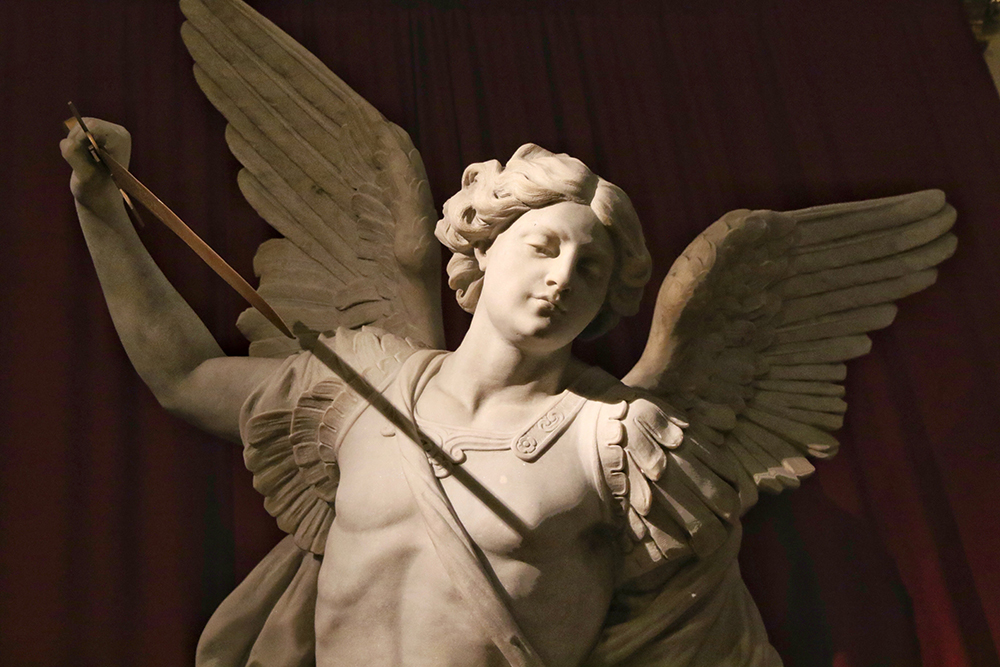
WASHINGTON — It seems like angels are having a moment.
A poll this summer showed that 7 in 10 U.S. adults say they believe in angels — more than they believe in the devil (56%), astrology (34%), and reincarnation (34%).
The appeal of these spiritual beings may come in part from their very name which comes from the Greek word “angelos,” which means messenger. In these times of frenetic busyness, some say it’s possible that people could be seeking a spiritual message and are willing to accept it from a being that seems unthreatening, there to help, and everywhere.
The poll, released in July, was issued by The Associated Press-NORC Center for Public Affairs Research. It was conducted May 11-15, polling 1,680 adults from a sample designed to represent the U.S. population. The margin of sampling error was plus or minus 3.4 percentage points.
When the poll broke down the responses by religious affiliation, 84% of those who said they believed in angels had a religious affiliation and angel believers included 94% of evangelical Protestants, 81% of mainline Protestants, and 82% of Catholics.
The poll’s results did not surprise Susan Garrett, an angel expert and New Testament professor at Louisville Presbyterian Theological Seminary in Kentucky. She told The Associated Press that the poll goes along with historical surveys, adding that the U.S. remains a faith-filled country even as more Americans reject organized religion.
As she sees it, angels are “very malleable,” and that even people with different ideas on religion and spirituality can find room to believe in angels.
There are also different depictions of angels from the winged cherubs with baby faces to powerful biblical figures pictured with swords fighting off demons.
Catholic scholars are leery of an angel obsession that is more of a New Age trend and say ultimately one’s belief in an angel should draw that person closer to God.
In a homily a few years ago on the feast of the Guardian Angels, Pope Francis said Christians have guardian angels to encourage and guide them, so they won’t become sluggish.
“So many people don’t know how to walk or are afraid of taking a risk and they remain still,” he said, adding that one’s angel comes along and “pushes us to walk.”
He quoted a passage from the Book of Exodus where God promised the Israelites that he was “sending an angel before you, to guard you on the way and bring you to the place I have prepared.”
The pope also described guardian angels as companions and protectors who walk along with people and serve as compasses helping to see the way they should go and to avoid dangers along the way.

“I would like to ask you all a question: Do you speak to your angel?” the pope asked. “Do you know the name of your angel? Do you listen to your angel? Do you let yourself be taken by the hand along the path or pushed to move?”
He said that by obeying their guardian angels, Christians can avoid the dangers of taking the wrong path.
“The angel is the daily door toward transcendence, to the encounter with the Father,” Pope Francis said. “The angel helps me walk along the path because he looks at the Father who knows the way. Let us not forget this traveling companion.”
But for all their positive imagery, as travel companions or helpers, angels also had a role in the Bible of delivering messages that can be challenging, including the angel Gabriel’s message to Mary about bearing a son, Jesus, followed by his admonition that she should not be afraid.
A 2020 column about angels in the magazine U.S. Catholic points out that the angelic command “be not afraid” is more of an urge to be brave than a reassurance that all is well.
It also notes that if people believe the world is filled with angelic messengers then they should look at life differently, “with our eyes, ears, and hearts open to their messages. And when the message lands, to greet the moment without fear.”
